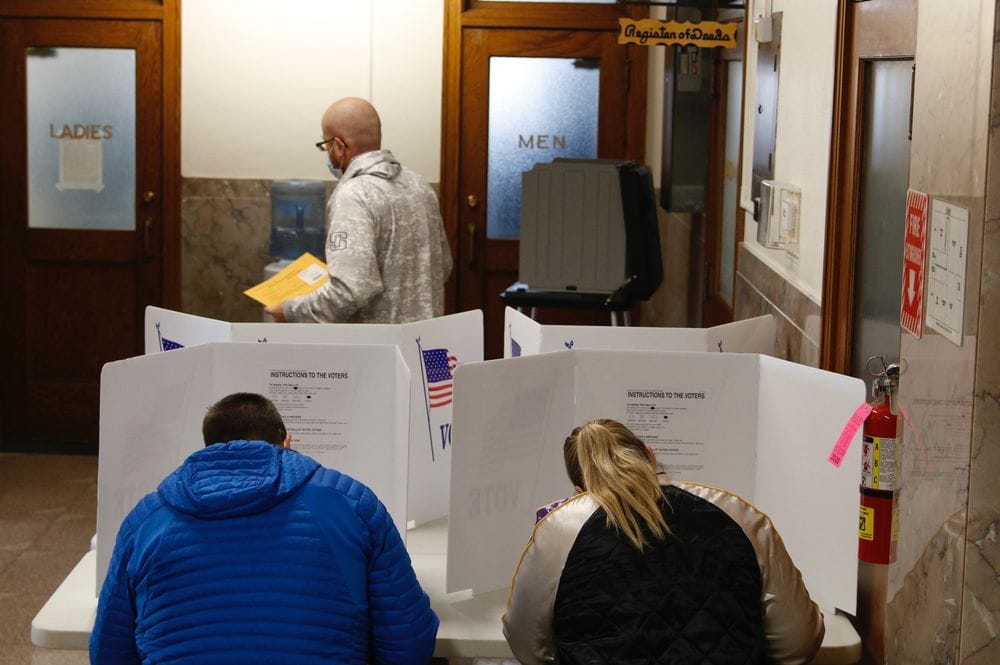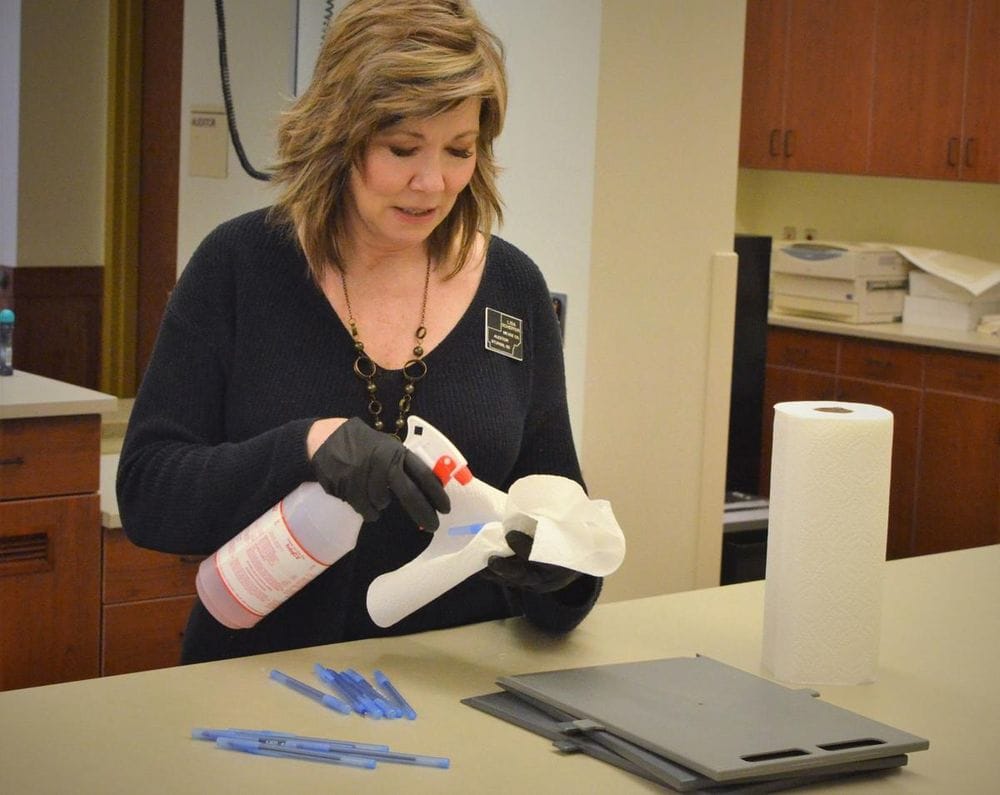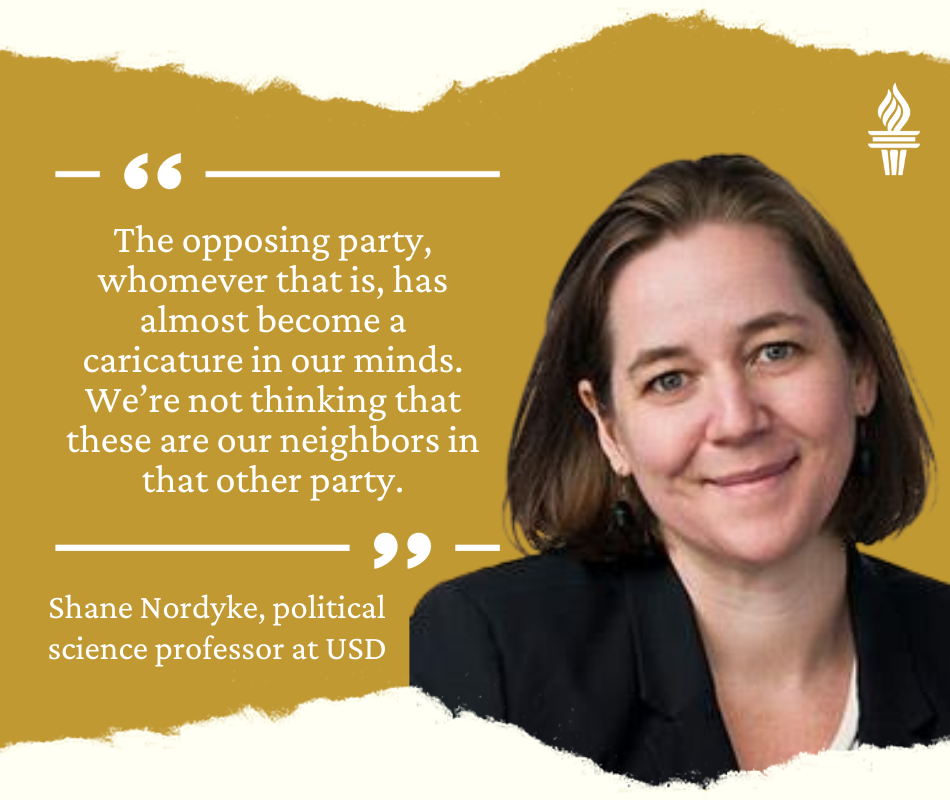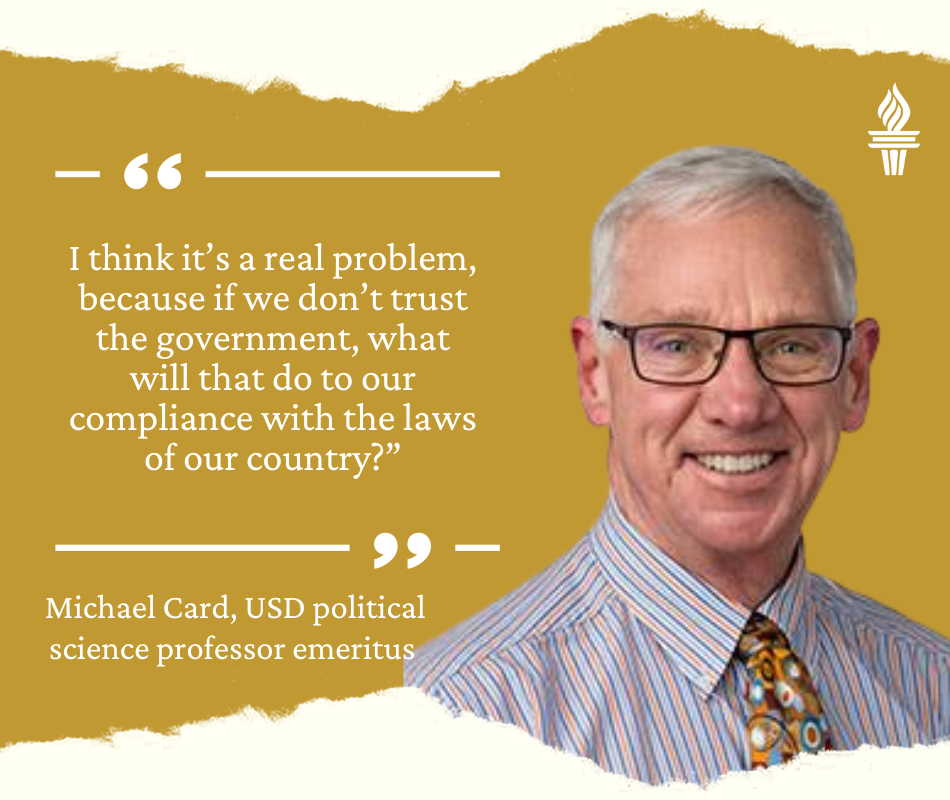
Bart Pfankuch/South Dakota News Watch – A new statewide poll has exposed deep concerns among South Dakota voters that the U.S. democratic system of government is at risk and also revealed that almost half of voters agree that violence is an acceptable method of protecting the democracy.
Political science professor Shane Nordyke of the University of South Dakota in Vermillion, S.D., is not surprised, although she is somewhat dismayed, by the new statewide poll results generally showing that many South Dakota voters question the integrity of elections and that a vast majority believe that American democracy is currently under threat.
As the director of the Chiesman Center for Democracy at USD, Nordyke has seen consistent polling in recent years showing that South Dakota voters are concerned about the security of elections, have doubts about the stability of democracy and are worried that civility in the country is on the wane.
The poll, commissioned jointly by South Dakota News Watch and the Chiesman center, generally shows a continuation of those trends.
“I don’t know that any of this is a surprise necessarily,” Nordyke said in an interview. “This seems to be the one universal thing that we all agree upon, that these democratic norms we’ve been accustomed to are being eroded and it seems like the system hasn’t worked appropriately.”
Democracy under attack, violence seen as option
The poll of random registered voters showed that 68.2% of respondents saying American democracy is “under attack” and 25.8% saying it is “being tested.”
The results showed the concerns were shared at fairly consistent levels among all political parties, including 96.8% of Republicans, 95.1% of Democrats and 87.7% of Independent or No Party Affiliation voters seeing democracy at some level of risk.
Furthermore, 39% of respondents overall said it is acceptable to engage in violence to protect American democracy, while 56% said it is unacceptable.
Republicans led the way in finding violence acceptable, with 16.5% in strong agreement and 30.6% somewhat agreeing that violence is acceptable to protect democracy. Among Independents/NPA respondents, 14.6% strongly agreed that violence is acceptable and 22.3% somewhat agreed, while among Democrats, 13.9% strongly agreed violence is acceptable and 9.0% somewhat agreed.
Jon Schaff, a political science professor at Northern State University in Aberdeen, S.D., reviewed the poll results and said it is clear that most South Dakotans are worried about the strength of our democracy, though for very different reasons depending on political party affiliation.
Republicans, for example, may agree that the election was stolen from former President Donald Trump and that the electoral system is corrupt. Democrats, meanwhile, may believe that Trump himself is the real threat to democracy as he continually questions or attacks democratic norms, processes and long-held faith in institutions.
Schaff expressed concern but also some doubt about whether so many South Dakotans actually support violence as a way to protect democracy.
People who are generally disgruntled or upset about politics and government may overstate their feelings when contacted by a pollster, he said. However, Schaff did not downplay the significance of the high level of respondents who said they accept violence as a path forward for American democracy.
“To a certain degree, when people give extreme answers to poll questions, you do have to take that with a certain grain of salt because some people will say anything to a pollster if they’re grumpy enough,” Schaff said. “However, if you say you’re willing to resort to violence in order to stop another party from taking power, that’s pretty scary and indicative of some deep level of distrust in our country right now.”
Part and parcel of the concerns over the stability of democracy are voter suspicions about the integrity of elections, including the 2020 presidential election in which President Joe Biden defeated Trump.
“When you have even a significant minority that doesn’t really trust the electoral system and isn’t confident that our elections are competently run in a manner that suggests integrity or legitimacy, you’ve probably got a real problem,” said Schaff. “I think it’s very worth worrying about.”

Third of GOP voters unsure if Biden won
The late November poll found that while 67% of overall respondents accept that Biden defeated Trump, 32% do not accept that outcome despite a lack of clear evidence of fraud.
Among Republicans, about half accept the 2020 results (49.6%) but nearly the same number do not accept the results (49.2%). Meanwhile, 94.3% of Democrats said they accept the 2020 outcome, and 74.6% of Independents/NPA voters also accept that Biden won.
Furthermore, about 42% of all respondents said then are “not confident “or “not too confident” that election results in America reflect the will of the people (56% are very or somewhat confident). Doubts about election integrity were highest among Republicans (49.2% not confident) followed by Independents/NPA (44.6% not confident) and then Democrats (23.8% not confident.)
The poll also found that most people have more trust in local election officials than state election leaders but indicated that many voters do not trust the results from states dominated by political parties of which they are not a member.
Nordyke said concerns about election integrity and strength of democracy pre-date the 2020 election and the Jan. 6, 2021, insurrection at the U.S. Capitol. But she added that Trump’s consistent claims that the election was stolen have intensified concerns among some voters that the system cannot be trusted.
“We have had a very strong norm in our democratic process from the beginning that the person who loses the election concedes very quickly and moves on, but you didn’t see that in 2020,” she said. “That peaceful transition of power is a very powerful and important norm for success of our democracy, and it’s the erosion of those norms that are causing concern.”
Distrust leads to greater distrust
Nordyke speculated that the highly divisive politics common in American government today are causing a cycle in which people are less and less inclined to talk about problems or work together to find common ground and possibly solutions.
“The opposing party, whomever that is, has almost become a caricature in our minds. We’re not thinking that these are our neighbors in that other party,” she said. “We are moving further and further away from the types of activities and platforms with people who have very different views where we are able to talk about important issues in a civil way.”

Concerns over the integrity of elections is an issue that seems unlikely to fade.
Just as Trump continues to question election results and decry the integrity of the system, Minnehaha County Auditor Leah Anderson recently questioned the accuracy of voting systems used by county voters.
USD political science professor emeritus Michael Card said the lack of faith in government began decades ago, when trust in government peaked with the passage of the American Civil Rights Act in 1965. “Trust in government then was at 80% and we’re at the lowest point ever now,” he said.
In more recent times, the devastation and isolation caused by the COVID-19 pandemic challenged the sense of security held by many Americans and may have fed a new level of distrust in government, elected officials and American institutions, Card said.
‘Confirmation bias’ opens door to manipulation
Constant questioning of the 2020 presidential election results, and doubts expressed by election officials such as Anderson, have further fueled that distrust and angst and could ultimately lead to greater lawlessness, he said.
That crucible of divisiveness can open the door for people with an agenda or a strong personal view to readily influence others, not unlike how Minnesota election denier Rick Weible has come to South Dakota to sow distrust in elections, as reported by News Watch in November.
“I think it’s a real problem because if we don’t trust the government, what will that do to our compliance with the laws of our country?” Card asked. “If we don’t trust a police officer to fairly execute traffic laws, for example, I’m much more likely to speed or be on my cellphone while driving.”
Card also raised concerns about an increase in what political scientists describe as “confirmation bias” in which people tend to listen only to people or leaders who agree with beliefs they already hold. That phenomenon can increase divisiveness both in politics and in daily life in a society, he said.
“We don’t see contradictory information,” Card said. “We see very clearly the evidence that fits the notion we already walk into a room with.”
Increased divisiveness can exacerbate incivility as people become less inclined to share new or contradictory ideas with one another, which can cause greater isolation and divisiveness among factions of society, he said.
A News Watch/Chiesman poll taken in fall 2020 showed that nearly 8 in 10 registered South Dakota voters (79.0%) said that civility in America had gotten worse over the past five years, while 2.6% said civility had improved during that time.

As evidence of confirmation bias, Card pointed to a new poll by the Washington Post that found Americans moving away from the idea that 2020 election was legitimate or that the attack on the Capitol was a violent riot.
The Post poll found that compared to a similar poll taken in late 2021, Republican respondents are now less likely to believe that Capitol riot participants were “mostly violent,” less likely to believe Trump was responsible for the attack and that they are slightly less likely to see Biden as the legitimate winner of the 2020 election.
“If we’re subject to this confirmation bias, we are subject to being manipulated in a certain direction,” Card said.
Possible upside to democracy concerns
And yet, Nordyke said there are some positive messages within the new News Watch/Chiesman poll results, including the fact that so many South Dakota voters are concerned about the fragility of our democracy, which might cause people to hold themselves and elected officials accountable for what they say.
“In some ways this is a positive sign, a possible upside to the concerns about democracy,” she said. “When you’re concerned, you’re more likely to say, ‘Huh, we need to pay more attention to this problem.'”
Schaff said that in the current political environment there is unlikely to be a single or simple solution to improving civility, trust in elections and faith in democracy among voters.
He suggested people could spend less time on their phones and more time reading a book or talking directly with others. They can stop watching partisan news and not fall victim to leaders and media members who try to manipulate their passions by stirring up anger and resentment toward those who disagree. And he said voters can make better choices on Election Day to support candidates who are more “statesmanlike” and who work toward improving the country and its people more so than solely trying to remain popular or powerful.
Whatever the solution, Schaff said he hopes the tide turns soon toward greater civility, more trust earned by government and greater overall faith in American democracy.
“There’s no quick solution to these problems,” he said. “Because that’s sort of how you lose a civil culture, gradually and then all at once, and maybe we’re seeing the ‘all at once’ happening right before our eyes.”
